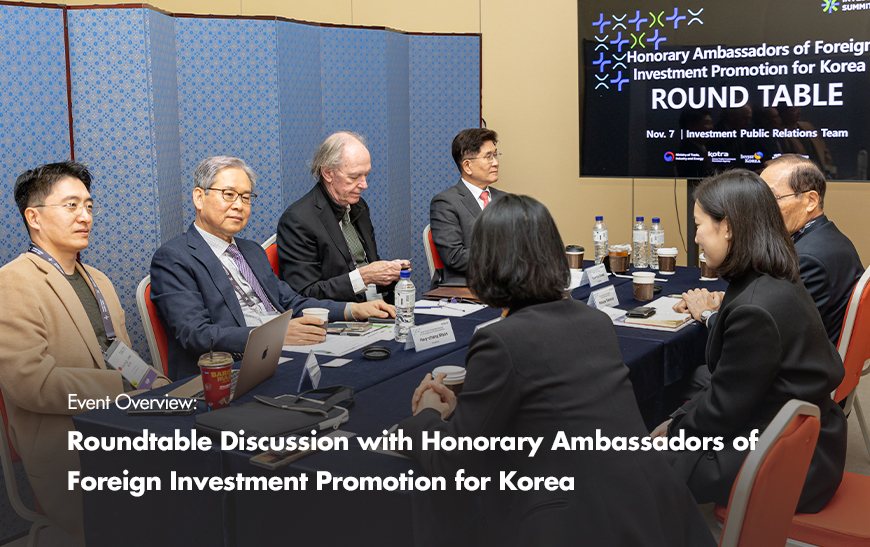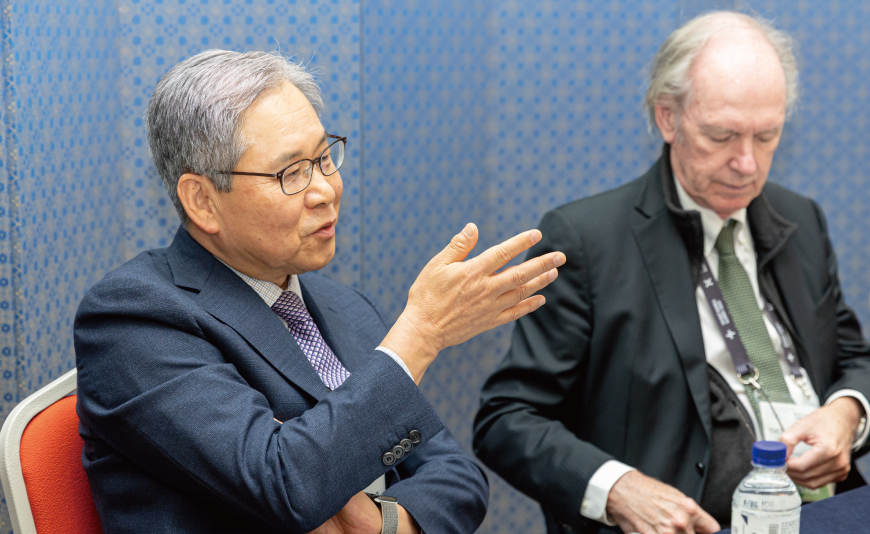
At the Invest KOREA Summit 2023, held in the port city of Busan last November, five of our honorary ambassadors of foreign investment promotion for Korea, appointed by the Ministry of Trade, Industry and Energy, gathered together for a special roundtable discussion on Korea’s investment environment and ways to enhance multilateral investment cooperation.
Honorary Ambassador Profiles

- Thomas Byrne, President & CEO of the Korea Society, Adjunct Professor of the School of International and Public Affairs at Columbia University, Former Senior Vice President of Moody’s Investors Services
- Hwy-chang Moon, President at the Seoul School of Integrated Sciences & Technologies, Professor Emeritus at Seoul National University, Chairman of the Institute for Policy and Strategy on National Competitiveness, Consultant to UNCTAD
- Youngjae Kim, Senior Research Fellow (VP) of LG Electronics, Member of the Advisory Board on Robotics Engineering at the Consumer Technology Association
- Tong-soo Chung, Chairman of Global Unity Holdings, AKR Corp., Former Head of Invest KOREA, Former Deputy Assistance Secretary at the International Trade Administration
- Nobuya Takasugi, Chairman of the Asia-Pacific Policy Research Institute Advisory Council, Former President of the Seoul Japan Club, Former CEO of Fuji Xerox Korea
All of them agreed that there is a growing need for Korea to be more proactive in publicizing the advantages of doing business here. In particular, local governments of non-capital regions of the country were encouraged to actively promote the strengths and characteristics special to their respective regions to attract more foreign direct investment (FDI) to the areas.
Thomas Byrne shared about his first visit to Korea in the late 1960s, and how one could have never imagined that the country would transform into the nation it is today. He also highlighted the country’s innovative bio industry, impressed at its robust manufacturing sector and the ways in which it effectively handled the Covid-19 pandemic.
Hwy-chang Moon credited the Korean people for the country’s extraordinary transformation from an aid recipient to now, an aid donor. He cleverly summarized the characteristics of Korea’s job force with the acronym “ABCD”—A standing for agility, B for benchmarking, C for convergence, and D for diligence. Based on these qualities, he said the Korean people have the capability to quickly absorb other cultures and technologies, then applying them to the local culture and circumstances. He noted that Koreans’ diligence and hardworking tendencies were the determining factor for Korea’s outstanding growth over the years.

There was also a shared consensus on the need for more investor relations (IR) and investment consultations better tailored to the current demands of companies. Moon emphasized the need for a more focused approach for investment attraction such as company-to-company efforts, going beyond the national level and deeper into the enterprise level.
In terms of multilateral cooperation in the field of investment, all of the honorary ambassadors stressed the importance of cooperation of public and private sectors of all countries represented at the meeting.
Tong-soo Chung explained that because Korea is well-connected within the global economy, this would greatly help the country attract more FDI going forward. Korea currently has signed 21 free trade agreements (FTAs) with 59 countries. Chung also described his direct experience of seeing Korea develop through soft power like K-Pop, food and tourism, which has garnered massive international interest over the last ten years.
Nobuya Takasugi credited Korea’s economic growth to the country’s technological prowess and manufacturing capabilities. He emphasized the need to strengthen Korea-Japan cooperation in all aspects, in the form of a free trade agreement (FTA), economic partnership agreement (EPA) or comprehensive economic agreement (CEPA), to enhance the business environment for companies of both countries. He expressed his hope to see the two nations work together more closely, particularly in the parts and materials industry, saying Korea and Japan each have a tremendous amount of knowledge and experience to offer one another for mutual growth.
By Grace Park
Investment PR Team, Invest KOREA
Korea Trade-Investment Promotion Agency (KOTRA)










